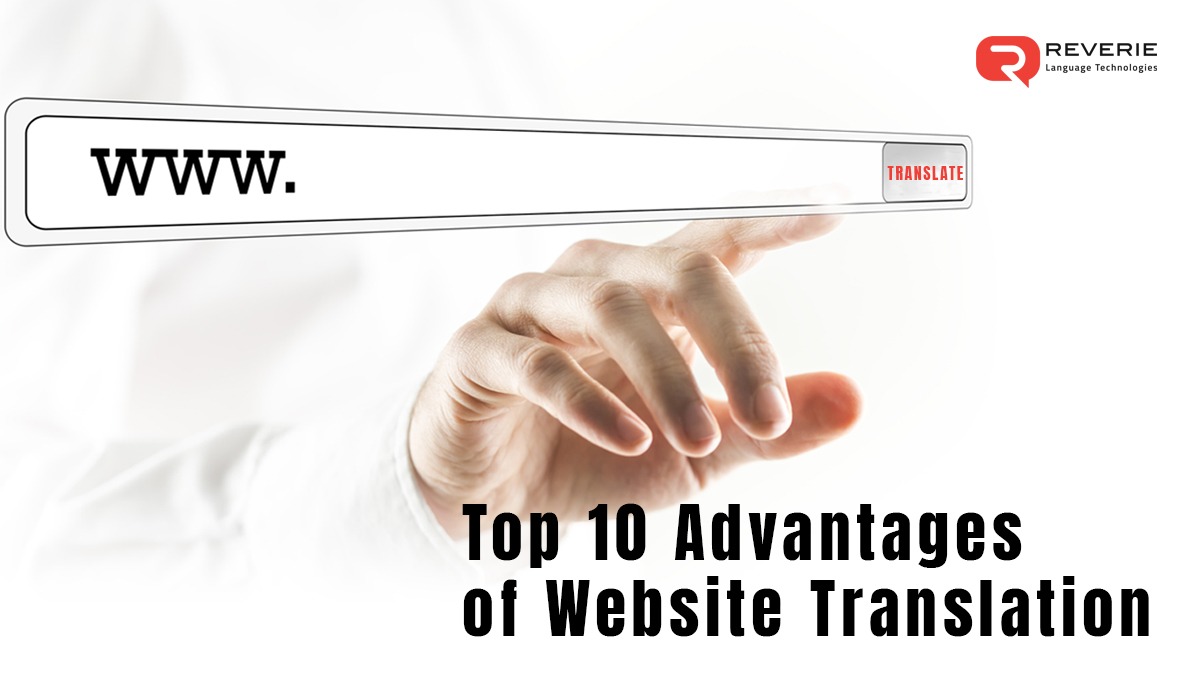We are living in an interconnected world, where website translation has become essential for businesses. This is particularly true for businesses aiming to expand their reach and enhance their online presence in local markets. If you are aspiring to capture a diverse and multilingual market, like India, you can’t afford to neglect website translation.
- To note: According to studies, about 90% of internet users in India prefer to search the web in their native language.
In addition, businesses are rapidly growing online. This has made website translation essential for these businesses to reach a broader audience and find success.
Regardless of the type of business you have, website translation can be beneficial for you. If you have an online presence and are catering to a market such as India or a global market you should translate website content into multiple languages to stand out from the competition. In this article, we’ll discuss the top 10 benefits of website translation for your business.
1. Better Local Reach
Translating your website opens up vast opportunities to reach a larger audience, particularly for businesses operating in multiple countries and different regions within the same country such as India.
Here’s how it can help you enhance your reach:
- You can significantly expand your footprint in the local markets.
- Catering to regional languages can help drive substantial engagement and growth.
- It helps in establishing a strong presence in emerging and existing markets alike.
By offering content in multiple languages, you tap into the vast pool of non-English speaking customers. And, translating your website can turn out to be a strategic move for your business.
2. Enhanced User Experience
Providing your customers with an authentic online experience is an important aspect of any business. This is where translating your website can come in handy for your business:
- It significantly enhances the customers’ experience on your website.
- It improves navigation, understanding, and overall satisfaction.
- It allows users to easily access and comprehend information in their preferred language. This increases the likelihood of them engaging with the content and revisiting the site.
The customised approach leads to a more profound connection with the clients. Thus, driving higher engagement rates and expanding client loyalty. This ultimately drives better business outcomes.
- Example: Reverie helped a leading automobile brand to seamlessly translate their website into 11 Indian languages. Reverie localised 800 URLs for the website, which resulted in a 10% increase in the number of visitors.
3. Improved SEO Performance
One of the biggest advantages of website translation is its impact on your website’s SEO (search engine optimisation) performance. You can tailor your content to rank higher in search results for various languages.
- It enhances the website’s search engine ranking across different languages.
- It also improves its online visibility.
- It helps you reach a broader audience and increase your website traffic.
In addition, search engines like Google give preference to websites that offer localised content. It recognises the relevance and value the website offers to its users. It also enhances the site’s authority and search engine performance.
- For instance: A well-translated website, catering to specific language preferences, can rank high in local search engines. This enhances the website’s online visibility, leading to higher click-through rates.
4. Higher Conversion Rates
Content translated into the native language resonates better with your audiences. It can enhance engagement and increase conversion rates. By translating your website, you can effectively communicate with your customers in their native language. This makes the content you put on your website much more relatable to the target audience.
Here’s a table that compares the values of key performance indicators (KPIs), such as conversion rates, reach, and user engagement for a translated website versus a non-translated website.
KPI | Translated Website | Non-Translated Website |
Regional Reach |
|
|
Conversion Rates |
|
|
User Engagement |
|
|
SEO Performance |
|
|
By leveraging this approach, you can expect substantial growth in sales and customer interactions. Particularly in markets like India, where local language content is highly valued, by investing in translation, you capture a larger share of the market. Offering content that speaks directly to the cultural and linguistic preferences of your audience can boost customer satisfaction.
5. Competitive Advantage
Another key advantage of website translation is that your business gets an edge over your competitors. Many companies have still not adopted this strategy. This presents an opportunity for you to stand out in the market.
Here are a few ways, you can differentiate your business from your competition:
- By offering multilingual content, you can attract a broader audience.
- With this proactive approach, you can capture new customer segments while also showcasing your commitment to inclusivity.
In markets where competition is fierce, you can set your business apart by having a multilingual website.
6. Cultural Relevance and Connection
Understanding and respecting cultural nuances leads to successful marketing and customer relations. With translated content, you can connect with diverse cultural groups more effectively, which results in:
- Ensuring that every message is culturally appropriate and resonates with the target audience.
- Fostering stronger relationships while building loyalty among local customers.
- Significantly boosting your brand’s appeal in a multicultural market like in India.
- Establishing deeper, more meaningful connections with your customers.
7. Access to Emerging Markets
Emerging markets present significant growth opportunities for businesses. So, it makes sense to translate websites to effectively tap into these fast-growing markets. You can capture new customers and drive substantial expansion.
- To note: India boasts a rapidly increasing internet user base, with more than 820 million active internet users. In fact, more than 50% of them belong to rural areas.
This burgeoning digital population in India offers a massive opportunity for businesses to expand their customer base.
8. Compliance with Local Regulations
In some regions, translating your website can be more than just a strategy. Certain industries and markets may require the companies to have content in local languages.
For instance:
- The EU General Data Protection Regulation (GDPR) requires websites operating in the EU to have content for privacy policy and other data-related information in the language chosen by the user.
- The Consumer Protection Act (2019) of India. It mandates that the information about the products or services, including warranties, guarantees, and return policies, on a website must be in a language understood by the consumer.
Translating your website ensures compliance with these laws. Adhering to these regulations can have several benefits for your business:
- Avoid potential legal issues and penalties.
- Establish your business as trustworthy and reliable.
- Enhance the overall brand reputation.
By respecting local language requirements, you safeguard your operations while demonstrating a commitment to serving and valuing the local community.
9. Better Brand Perception and Image
A multilingual website significantly enhances a brand’s image and perception. It demonstrates professionalism, a global outlook, and a commitment to inclusivity.
- This approach strengthens your brand’s reputation while also increasing its appeal.
- It further positions the company as a forward-thinking and customer-centric company.
This makes website translation a great investment, as it helps you build a more robust and positive brand image.
10. Better Customer Support
You can enhance your customer support by translating your website into the preferred language of your users. By translating support resources on your website, you enable customers to find solutions to their queries more quickly and effectively. These support resources may include:
- FAQs
- Manuals
- Contact information
This not only improves the overall customer experience but also reduces the burden on your support team.
Conclusion
Translating your website can provide you with a number of benefits. These benefits can range from expanding local reach and enhanced SEO performance to enhanced user experience and strong customer loyalty. Website translation helps you ensure that your content resonates with diverse linguistic groups. As a result, engagement rates and conversion rates increase.
In addition, website translation also offers you the opportunity to tap into emerging markets. If you’re wondering how to translate a website to leverage these benefits, Reverie’s language solutions and tools can help you. These solutions can efficiently translate websites online. To learn more about Reverie’s language solutions and tools, and understand how they can benefit your business, book a free demo today.
FAQs
What is Website Translation? Is it important for all businesses?
Website translation refers to translating a website’s content from one language to another. This makes the website more accessible to a broader audience. It is important for all businesses, as it allows them to reach potential customers who do not speak English. It also enhances user experience and improves online presence.
Can website translation improve conversion rates?
Yes, website translation makes the content more relatable and understandable for non-English speaking users. Localised content resonates better with that user base, which leads to higher engagement, helping in increasing conversion rates.
What are some tools or platforms for website translation?
their website. These tools include:
- Anuvadak for website localisation
- IndoCord for AI-powered chat and voice bots which can be integrated on web and app interfaces.
- NMT
- Transliteration
These tools streamline the translation process and ensure accuracy and efficiency.


